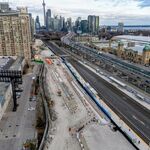GTAA hasn't undertaken a significant expansion program in awhile. I haven't gone through the financials, but do you see their fees coming down? Or are they keeping them at the same level (the carriers are not going away) as a means to help finance a future expansion? I assume then that YUL and YVR debt loads will increase as a result of their expansions, possibly raising their landing fees to something comparable with YYZ. Also, why does the master plan indicate that an air side expansion is not on the horizon, when the airport is so slot restricted? I presume the business case doesn't justify the expense - though that is counterintuitive to me as I would have thought that greater passenger growth and more flights would motivate an air side expansion.
















